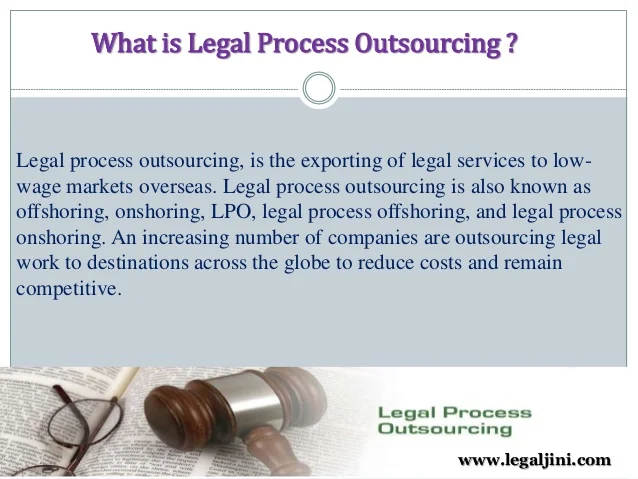In an increasingly competitive and fast-paced legal industry, firms are constantly seeking ways to enhance efficiency and reduce costs while maintaining the highest quality of legal services. One solution that has gained popularity is legal process outsourcing (LPO). This article explores the concept of legal process outsourcing and its impact on the legal industry.
Understanding Legal Process Outsourcing:
Legal process outsourcing refers to the delegation of specific legal tasks or processes to external service providers, either within the same country or overseas. These service providers, sometimes referred to as LPO providers, are typically equipped with specialized knowledge, skilled professionals, and advanced technology.

Benefits of Legal Process Outsourcing:
- Cost Savings: One of the primary benefits of legal process outsourcing is cost efficiency. By outsourcing certain legal tasks or processes, firms can significantly reduce overhead costs associated with staffing, training, technology, and infrastructure. Additionally, LPO providers often operate in regions with lower labor costs, providing cost savings without compromising on the quality of work.
- Improved Efficiency: Legal process outsourcing allows law firms to focus on core legal activities while delegating administrative tasks or routine processes to external providers. This division of labor leads to improved efficiency, as skilled professionals handle tasks with precision and speed. By streamlining operations and reallocating resources, firms can optimize productivity and deliver services more effectively.
- Access to Specialized Expertise: LPO providers often have professionals who possess specialized knowledge in specific legal domains. By outsourcing tasks to these experts, law firms can tap into a wider pool of specialized resources. This enables them to handle a broader range of legal matters, even those outside their usual scope of practice. Access to specialized expertise enhances the firm’s ability to provide comprehensive legal services to clients.
- Scalability and Flexibility: Legal process outsourcing offers scalability, allowing firms to expand or shrink their operations based on fluctuating workloads. During periods of high demand, firms can easily scale up their outsourced processes to meet client needs. Conversely, during slower periods, they can scale down without having to bear the burden of full-time staff. This flexibility enables firms to adapt quickly to changing market conditions and maintain cost-effectiveness.
Challenges and Considerations:
While legal process outsourcing offers numerous benefits, it is essential for law firms to consider certain factors when implementing this strategy:
- Confidentiality and Security: Law firms deal with sensitive and confidential client information. When outsourcing legal processes, it is crucial to ensure that the chosen provider adheres to strict security protocols and maintains the confidentiality of client data. Robust data protection measures, non-disclosure agreements, and secure technology systems are critical considerations.
- Quality Control: Maintaining high-quality standards is paramount when outsourcing legal processes. Law firms should establish clear communication channels, define performance metrics, and regularly evaluate the quality of work delivered by the LPO provider. This ensures that outsourced tasks are executed to the firm’s required standards.
- Cultural and Time Zone Differences: Outsourcing legal processes to providers in different countries may introduce cultural and time zone differences. It is crucial to have effective communication mechanisms in place to bridge these gaps. Establishing open lines of communication, leveraging technology, and being mindful of cultural nuances can help overcome these challenges.

Conclusion:
Legal process outsourcing has become an increasingly valuable strategy for law firms seeking to improve efficiency and reduce costs without compromising on the quality of legal services provided. By leveraging the expertise and resources of external providers, firms can streamline operations, tap into specialized knowledge, and enhance their overall competitiveness in a rapidly evolving legal industry.











